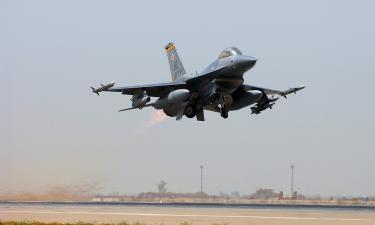UNITED (?) NATIONS POLICY ON IRAQ. BRITISH PETROLEUM BUYS IRAQI OIL AS U.S. INTELLIGENCE DECIDES WHETHER OR NOT TO BOMB
United States intelligence services report that President Saddam Hussein has managed to rebuild facilities for making weapons of mass destruction. However, at the same time, more and more companies from countries officially supporting the United Nations embargo on Baghdad buy Iraqi oil outside the terms of the UN's food-for-oil agreement. President George Bush has been warned by United States intelligence that Iraq has managed to rebuild facilities for making weapons of mass destruction at Falluja, west of Baghdad, after having been inspected by UN observers and subsequently bombed by NATO military aircrafts. It is reported that three factories have "dual use" status, meaning that they have the capacity for making items for civilian or military use. It is precisely this that holds the key to the issue. One factory, for example, is producing chlorine. This can be sold to make bleach or many other household products, used innocently by housewives every day. But because chlorine can also be used to make poisonous gas, any factory making it could be classified by arms control inspectors as a military facility and subsequently be bombed. The point is that the arms control inspectors had lost the goodwill of the Iraqi authorities after it became obvious that the only reason they had for visiting factories was to tell NATO warplanes the coordinates for them to be bombed hours later. The mood in Washington is apparently very tense, with the new Republican regime settling into office. President Hussein, who has never shirked confrontation, had his last great debacle with Bush Senior and many of the people on the same team as Bush Junior. After a sabre-rattling new year with military parades in Baghdad, some observers feel that the US president may wish to express a position of force and come down hard on Baghdad, alleging that chemical weapons are being manufactured. This hasty policy, however, is dangerous since without inspections in the field, there is a high risk of an actual (or virtual) hit against a civilian facility. As one British Intelligence spokesman stated: "Our information tallies with the American assessment. We are very suspicious about these factories, but we do not have proof that they are making weapons of mass destruction. That is why we want inspectors back on the ground to investigate." As the tension rises in Washington and Baghdad remains naturally reticent to allow back what it regards as spies, the united front against the trade embargo with Iraq grows weaker by the day. Arab nations are decidedly uneasy about the United Nations embargo and state that the only people it affects are innocent civilians. Meanwhile, an increasing number of companies from countries involved in NATO and the UN embargo are starting to trade openly with Baghdad. The latest were BP (British Petroleum), whose spokesman admitted openly that Iraqi oil had been bought "because the market is tight and it was available." Exxon Mobil, an American oil company, admitted that barrels of Iraqi oil had been obtained but justified this by stating: "They did not come directly from Iraq." Other companies to have completed deals with Iraqi Oil authorities outside the "food-for-oil" policy of the UNO, are Belmetalenergo (Belarus), Fener (Liechtenstein) and Italtech (Italy). Privately, commodities traders say that the UN programme has lost all credibility because the UN has stopped checking on who is buying from or selling to Iraq. A not-so-united United Nations front against Baghdad. Maybe the time has come for a more realistic policy, an end to demonology so often used by NATO countries in the 1980s and 1990s and a truly fair "new order" which adopts the same weight and measure in the handling of all situations, our corespondent Timothy Bancroft-Hinchey reports from Lisbon.
Subscribe to Pravda.Ru Telegram channel, Facebook, RSS!





